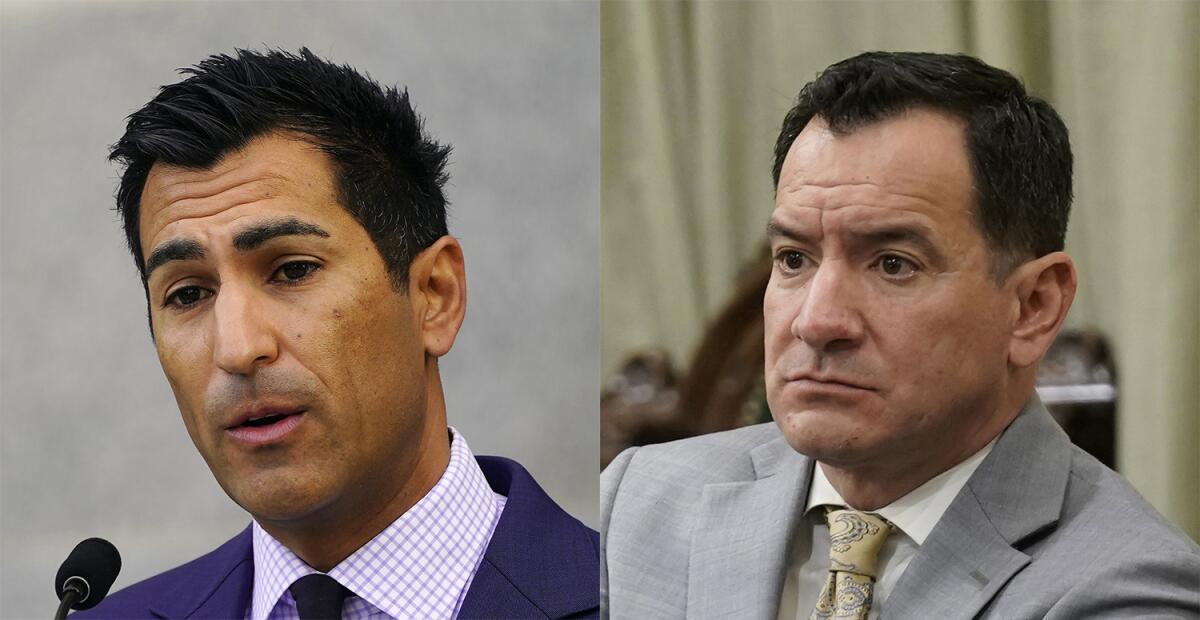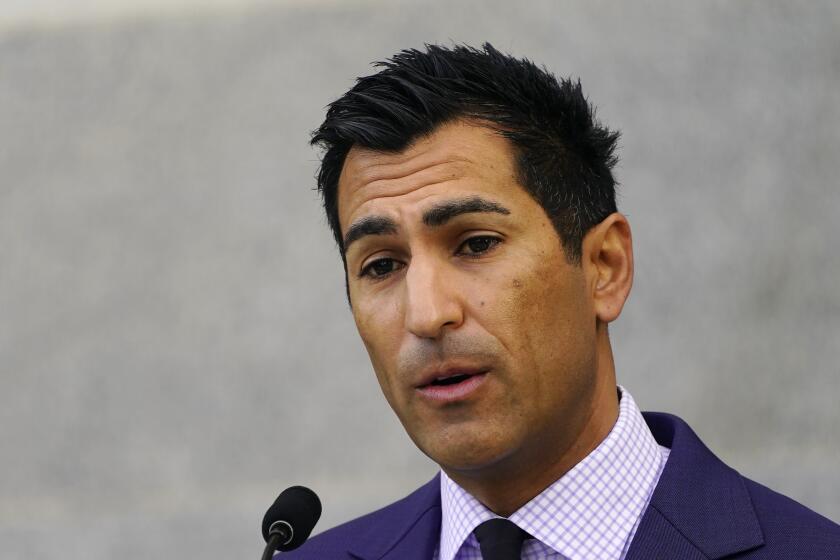Column: The outcome is still unclear in Rivas and Rendon’s fight to be California Assembly speaker

- Share via
SACRAMENTO — Besides governor, there’s no office in California government more powerful than Assembly speaker. That’s why competition for the job can be fierce.
And is now.
There’s a bruising speakership fight being waged mostly out of public view between current Speaker Anthony Rendon of Lakewood and Assemblyman Robert Rivas from Hollister in San Benito County.
The challenger seems to have the upper hand. But Rendon still has the office, and the outcome is unclear.
The bitter brawl is among Democrats who hold a supermajority of the 80 seats. They’ll control 60 after two vacancies are filled in Tuesday’s primary. A simple majority vote, 41, is needed to elect a speaker.
Rendon, 54, has been speaker six years. That’s longer than anyone since Willie Brown, who held onto the job for 14 and a half years until a brief Republican takeover and looming term limits forced him out in 1995. Then he was elected San Francisco mayor.
Rivas, 42, was elected to the Assembly in 2018 and would be the first Northern California speaker in 24 years. Seven of the last eight speakers have been from Los Angeles County, so his ascension would mark a geographical power shift.
The former county supervisor also would be the first speaker from a rural district in 52 years.
The rural roots are significant because a top Rivas priority is to make life better for agriculture laborers. Unlike city-reared speakers, he grew up in farmworker housing, eight crammed into a two-bedroom house on a vineyard. He has been chairman of the Assembly Agriculture Committee.
This is what’s so inviting about the job he seeks: The speaker appoints all Assembly committee chairs and members, fills scores of seats on state boards, including the Coastal Commission, and is a University of California regent.
The speaker and the Senate president pro tem — currently Toni Atkins of San Diego — are the Legislature’s principal negotiators with the governor. They can co-write the legislative agenda and singlehandedly kill any bill they don’t like.
The announcement was made Tuesday night in a joint statement with Assembly Speaker Anthony Rendon (D-Lakewood), capping a tumultuous power struggle.
In fact, five years ago Rendon scuttled Atkins’ bill to create a gargantuan state-run, single-payer, universal healthcare system. He was right. The Senate-passed measure was fiscally irresponsible, lacking a funding mechanism although it had a $400-billion annual price tag — double the state budget. But Rendon’s brave action created enemies.
He generated more enemies by acting less nobly at the end of the pandemic-marred 2020 legislative session.
He denied the request of Assemblywoman Buffy Wicks (D-Oakland) to vote by proxy because she was nursing a newborn baby. Wicks feared exposing the infant to COVID-19 if she brought her to the Assembly floor. But she did, to vote on hundreds of bills on the session’s final day. Meanwhile, senators were allowed to vote by Zoom.
Rendon was also accused by Atkins and other lawmakers of “running out the clock” on the final night, preventing several major Senate bills from being passed before the midnight deadline. Rendon called the accusation “absurd.” But it apparently wasn’t.
“Every speaker has a shelf life. That’s the reality,” says an assemblyman who’s supporting Rivas but didn’t want to be identified criticizing the still-powerful Rendon.
Everyone I talked to about the fight requested anonymity so they could speak candidly, except Rivas. But he wouldn’t publicly slam Rendon.
California voters seem unwilling to cross partisan lines in the state’s two biggest races on the June 7 primary ballot.
“The Legislature is ready for new energy, new leadership — a speaker who can work closely with the caucus and other leaders, like the pro tem,” Rivas told me.
His Assembly backers contend that under Rendon, the house has become fractured, tense and chaotic. But that’s inflamed by a speakership fight.
This is a natural power struggle. Rendon is on his way out anyway. He’ll be booted by term limits in 2024. Impatient wannabes have been jockeying for the job, making pitches to Democratic colleagues.
In November, Rendon stripped Assemblyman Evan Low (D-Campbell) of a committee chairmanship as he scurried for votes.
Also competing has been North Hollywood Assemblywoman Luz Rivas (no relation to Robert), whom Rendon seemed to be helping by contributing campaign money to her potential supporters. That worried Robert Rivas, so he stepped up his pace.
Right before Memorial Day weekend, Rivas walked into Rendon’s office holding 34 cards, each with the signature of a Democrat pledging a vote for speaker. That was a majority of Democrats. Normally it would lead to united caucus support.
Rivas asked the speaker to agree on a timetable for transfer of power. Rendon told him to buzz off, refusing to recognize the pledges. He said it wasn’t clear whether they were commitments to remove him now or to vote for Rivas when the speaker was ready to leave. And he wasn’t ready.
Then Rivas did something unprecedented. The challenger issued a press release declaring he had “secured enough votes [from Democrats] to become the next speaker.” He was sending a message of inevitability — everyone should jump aboard.
But clearly Rivas didn’t have enough votes to oust Rendon now or he would have.
He called for a caucus vote during a bitter six-hour Democratic meeting last week. But Rendon wouldn’t allow it.
They issued a strained joint press release.
Rendon acknowledged that Rivas had “the support of the current Democratic Caucus to succeed me.” But no timetable. And there’ll be a new caucus mix after the November election.
Rivas said he agreed with the caucus majority that Rendon “should remain as speaker for at least the rest of this legislative session.” It will end Aug. 31.
Rivas seems destined to be the next speaker. But it’s not a cinch. Votes on pledge cards don’t count until they’re cast on the chamber floor.
More to Read
Sign up for Essential California
The most important California stories and recommendations in your inbox every morning.
You may occasionally receive promotional content from the Los Angeles Times.













